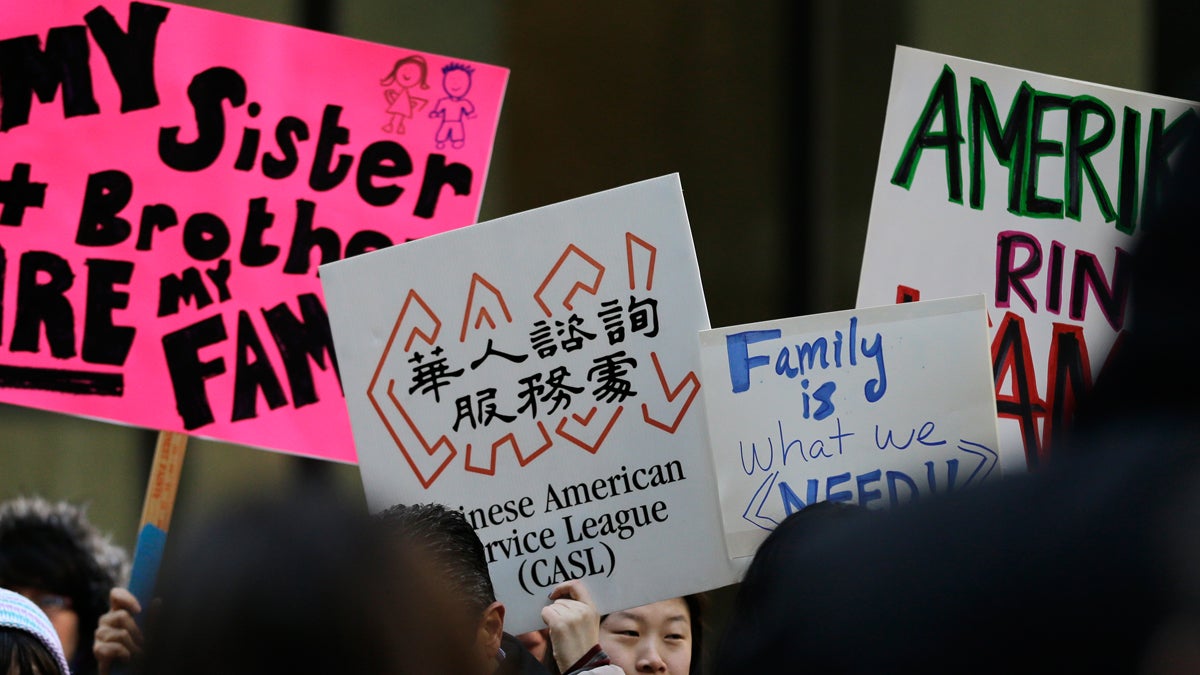‘Diversity visas’ and path from Africa may end in immigration overhaul

Immigrant rights protesters hold signs outside a Chicago federal building in March. Elected officials and leaders from the Asian
This week, the Senate takes up a massive bill that would overhaul the American immigration system for the first time since 1986.
One thing that is not in that bill is a program that has, since the 1990s, become the primary route to the U.S. for immigrants from Africa.
Winning the lottery
In eastern Nigeria, people call it playing the lottery, says Patrick Duru, who emigrated to the U.S. in 2004 on a so-called “diversity visa.”
“When I opened the letter [telling me I had won] I was so happy I was dancing […] My people got out. Everybody was cheering me. Everybody was happy.”
The diversity visa lottery is open to people like Duru who come from countries that have sent fewer people to the U.S. A lot of this country’s immigration system relies on family reunification, so once immigrants come from a specific country, it opens the door to more people from the same nation.
Duru was initially surprised to have received mail from America, because he didn’t know anyone in the United States. Relatively few Nigerians do. That translates into fewer Nigerians to sponsor others from their country.
The diversity visa program, created in 1990, now awards nearly half of 55,000 visas to African immigrants. A closely related statistic: half the immigrants from African countries now come to the U.S. on diversity visas.
Program faces elimination in Congress
The immigration legislation the Senate takes up this week eliminates this program. There’s not much support for it either in the Republican-controlled house. The potential loss of the venue for immigrants from Africa upsets members of the Congressional Black Caucus like Philadelphia Congressman Chaka Fattah.
“It’s important that … the Statue of Liberty represent an outreach to the world and not just certain pockets of people,” he argues, saying that a diverse immigrant pool also results in wide-ranging economic ties to the rest of the globe, including a fast-growing African economy.
“Can you run an immigration lottery in the U.S. and say no Mexicans need apply?” asks program critic Jan Ting. “No Filipinos? No Chinese. No Indians?”
A professor of law at Temple University, former assistant commissioner of the Immigration and Naturalization Service and also a blogger for Newsworks, Ting calls the program discriminatory and un-American.
“Our priorities are family reunification and job skills. And neither of those are reflected in the diversity visa program.”
Moreover, Ting alleges, a program that takes millions of applications from all over the world via the Internet invites people to cheat and game the system.
A 2007 study by the Government Accountability Office in 2007 found certain consular posts reported pervasive fraud, a lot of it by go-betweens who take advantage of applicants and collect large fees.
Patrick Duru, the immigrant from Nigeria, proposes that the program reduces another type of fraud — that more people would come from his home country illegally, if not for the small hope of someday winning the lottery.
In which case, Duru says, “You come over here. You be able to bring your parents after some years. You can fight for them. You can fight for your brothers and sisters.”
Duru became an American citizen five years ago. With the help of loans, he’s pursued higher education he could not have gotten in Nigeria and works in health care.
And it’s success stories like his that become one of the most potent arguments for opponents of the program. They say the program has worked in establishing immigrants from new nations and has run its course.
WHYY is your source for fact-based, in-depth journalism and information. As a nonprofit organization, we rely on financial support from readers like you. Please give today.

